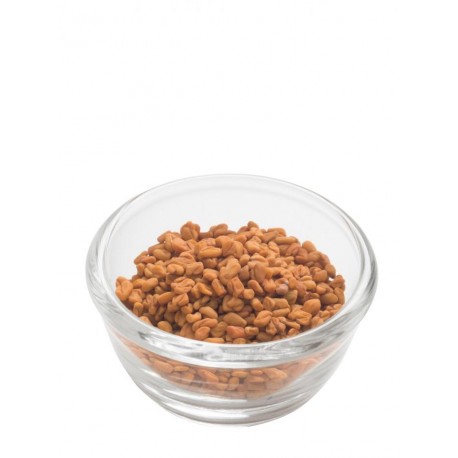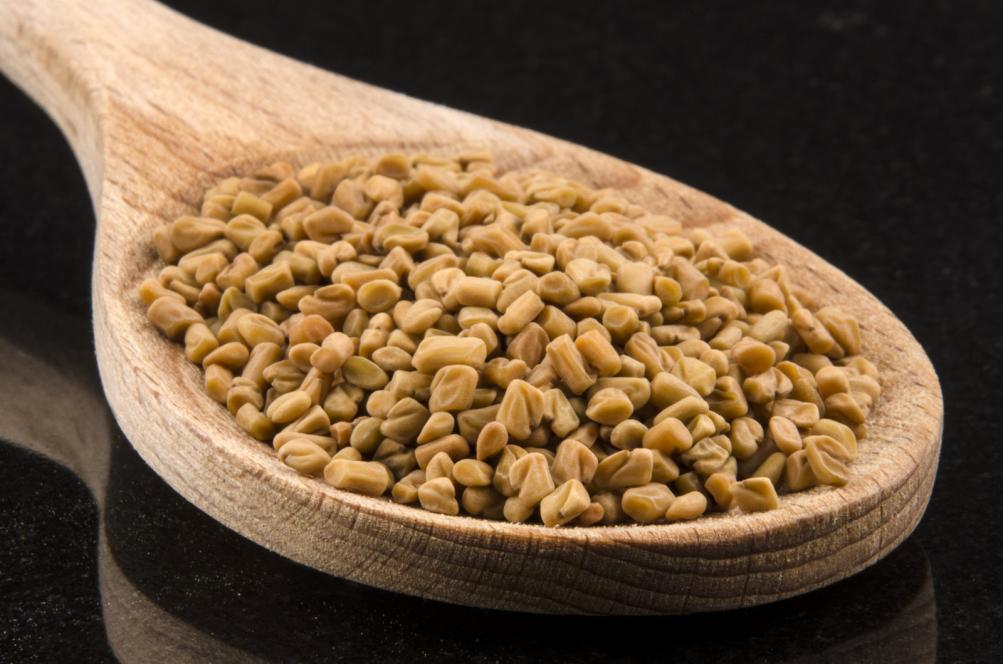- On sale!
- -20%








Fenugreek Seed (Halba in Arabic) is very advisable in profetic medicine , if people knew his value, it would buy even if its price is equal to the price of gold, due to its benefit .
Net weight : 250g
 Secure payment
Secure payment
You can pay securely
 Quick delivery
Quick delivery
We deliver your order directly after receipt of payment
 Satisfied or refunded
Satisfied or refunded
If you are not completely satisfied with your purchase, simply return for refund
Fenugreek Seed (Halba in Arabic)
Fenugreek seeds are used mainly in Middle Eastern cooking. It is an ingredient in most curries and chutneys.
Like fennel, fenugreek has been cultivated for centuries primarily because it was thought to have many healing virtues. It was even an ingredient in the "holy smoke" which was a part of the Egyptian embalming ritual. An old-fashioned Arabic greeting was, "May you tread in peace the soil where fenugreek grows." Indians often roast the seed before grinding, giving it a somewhat sweeter flavor.
Fenugreek seeds are tiny, bitter, dicotyledonous seeds of herb fenugreek. Toasted gently, they exhibit strongly aromatic and pungent flavor. Traditionally, fenugreeks have been found use to cure digestive problems and to improve breast milk secretion in the nursing mothers.
In the botany, fenugreek is a small annual leguminous herb belonging in the fabaceae family, genus: Trigonella. Scientific name: Trigonella foenum-graecum. Some of the common names of herb fenugreek include greek-hay, mehti, bird's foot, greek-clover, etc.
It is an annual herb which may reach 50 cm high and is native to the shores of the Black Sea. The plant is very used in India and in the Middle East, particularly for problems related to nutrition and diabetes.

Fenugreek is rich in mucilage, a substance that becomes gelatinous when mixed with water. which gives soothing properties on inflamed or irritated tissues.
In India, it incorporated the fenugreek spice in curry mixtures, and Ayurvedic medicine recommended to relieve arthritis, bronchitis and digestive disorders. Always in India, Jaipur Diabetes Research Centre, revealed that the extract of fenugreek lower blood glucose in diabetes II and that it reduced the resistance to insulin. It would also reduce triglyceride levels. It would seem that it would slow the melting of the muscles in the elderly.
Its rich in carbohydrates and proteins isthe fenugreek an outstanding plant in the case of undernutrition.
Use:
Use fenugreek as seeds, powder, tablets.
Traditional properties:
Chokes, anorexia: in case of weight loss or anorexia, using seeds reduced powder, for 2 g. by glass of water. Take 3 times not day.
Diabetes: It is a cure of choice in the pancreas and diabetes problems. A teaspoon of seeds for 2 cups of water. Boil to reduce to a Cup. Drink a cup a day, for a week and stop for a week. Back then.
Arthritis: Belgium researchers have discovered mild anti-inflammatory properties, which confirm the use made in India to treat arthritis and other inflammatory. As a decoction. 2 teaspoon of seeds for a cup of water; simmer for 10 minutes. Drink 2-3 cups per day. Not more than a week.
Sore throat: the softening properties of the mucilage-rich is the fenugreek, help to relieve the pain of the evil of throat and cough. Use as a decoction and gargle.
External use:
For the problems of skin inflammation, abscesses, tumours make a poultice with the seeds in powder. Place on the affected part.
Precautions: Considering the fenugreek as a plantsafe at a concentration of less than 0.05%. However, it is prudent not to extend an internal processing beyond a week. Always stop for a period of one week. Pregnant women should not consume the fenugreek.
Fenugreek seeds are rich source of minerals, vitamins, and phytonutrients. 100 g seeds carry 323 calories.
The seeds compose ample amounts of soluble dietary fiber. Soaking them in water softens their outer coat and turns it slimy (mucilaginous). 100 g of seeds provide am 24.6 g or over 65% of dietary fiber.
Non-starch polysaccharides (NSP) constitute major portion of this fiber content in the fenugreek seeds. Some important NSP's include saponins, hemicellulose, mucilage, tannin, and pectin. These compounds help lower blood LDL-cholesterol levels by inhibiting bile salts re-absorption in the colon. They also bind to toxins in the food and help to protect the colon mucusa from cancers.
NSPs (non-starch polysaccharides) increase the bulk of the food and speed up bowel movements. Altogether, NSPs assist in smooth digestion and help relieve constipation ailments.
It has been established that amino-acid 4-hydroxy isoleucine in the fenugreek seeds has facilitator action on insulin secretion. In addition, fiber in the seeds helps lower rate of glucose absorption in the intestines, and thus help regulate blood sugar levels. Fenugreek seeds are therefore one of the recommendeded food ingredients in the diabetic diet.
The seeds contain many phytochemical compounds such as choline, trigonelline diosgenin, yamogenin, gitogenin, tigogenin and neotigogens. Together, these compounds attribute for the medicinal properties of fenugreeks.
This prized spice is an excellent sources of minerals like copper, potassium, calcium, iron, selenium, zinc, manganese, and magnesium. Potassium is an important component of cell and body fluids that helps control heart rate and blood pressure by countering action on sodium. Iron is essential for red blood cell production and as a co-factor for cytochrome-oxidases enzymes.
It is also rich in many vital vitamins that are essential nutrients for optimum health, including thiamin, pyridoxine (vitamin B6), folic acid, riboflavin, niacin, vitamin A, and vitamin-C.
Fenugreek is a very rich spice that contains:
phosphorus,.
iron,.
sulfur,.
Nicotinic Acid.
alkaloids,
Saponins (responsible for its stimulant properties of appetite), flavonoids,
carbohydrates,
vitamins A, B1, C,
magnesium,
calcium,
lecithin,
proteins (30%),
steroid saponins (diosgenin and yamogenine, which contribute to the synthesis of cholesterol and sex hormones).
Contribute to controlling the rate of glucose and cholesterol levels in people with diabetes.
Stimulate appetite (internal route) and relieve inflammation (external route).
Fortify the convalescent, treat dysentery, dyspepsia, chronic cough, bronchitis, colds and allergies, as well as osteoarthritis and postherpetic; stimulate uterine contractions and lactation (milk maternail bounds).
In addition to its digestive properties, was given him the power to fight the infection and inflammation of the respiratory tract, facilitate the milk of the crop, to treat skin wounds, rheumatic pain, etc.
Treatinflammatory bowel diseases (diarrhea and intestinal infections). Other tests on laboratory animals indicate that seeds have a protective effect against gastric ulcers.
Fenugreek is rich in mucilage, a substance that becomes gelatinous when mixed with water, which gives soothing properties on inflamed or irritated tissues.
It is recommended to relieve arthritis, bronchitis and digestive disorders
Fenugreek seeds have multiple properties:
** Diuretic
** Reduced blood glucose levels
** Lowers the cholesterol and triglycerides
** In the case of asthenia replenishing
** Stimulant of the pancreas
** Anti-inflammatory
Medicinal uses of fenugreek seed
Its seeds have been used in many traditional medicines as a laxative, digestive, and as a remedy for cough and bronchitis.
If used regularly, fenugreeks may help control cholesterol, triglyceride as well as high blood sugar (glycemic) levels in diabetics.
Fenugreek seeds added to cereals and wheat flour (bread) or made into gruel, given to the nursing mothers may increase breast milk production.
Selection and storage
Fenugreek seeds are readily available in the spice stores all around the year. One may find different forms of seeds such as whole seeds, powdered or vacuum packed paste in these stores.
Choose whole seeds from authentic brands. The seeds should feature bright golden-yellow color, hard and exude delicate maple flavor. Avoid old stocks as they may infected by fungal mold and out of flavor.
Store whole seeds in airtight glass container and place in a cool, dark place where it can stay fresh for several months. Powdered or paste form of fenugreek, however, should be kept in the air-sealed packets and placed inside the refrigerator.
Culinary uses
Traditionally, fenugreek seeds are being used in a wide range of culinary recipes, especially in spice mix. The seeds either in the forms of whole seeds, sprouted, powder, sauce or as paste used in a variety of savory dishes in many parts of Middle-East, India, Mediterranean and Central Asian regions.
The seeds should be added in small quantities in food since they possess strong aroma and bitter taste. Dry fry under light heat in order to mellow their flavor.
Here are some serving tips:
Fenugreek is one of the chief ingredients in Indian curry and masala powders.
Small quantity of sprouted seeds added to vegetables and lentil dishes.
Fenugreek greens, known as methi, either fresh or dried, is one of the prominent leafy-greens featuring in India, Pakistan, and Persian cooking with spinach, potato (aaloo-methi), carrots, etc.
Sprouted fenugreek seeds are used in salads, paste, dips, fillings, etc.